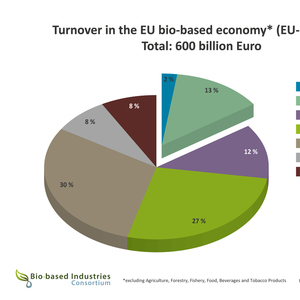Report quantifies employment, turnover impacts of EU bioeconomy

Biobased Industries Consortium
March 17, 2016
BY Erin Krueger
A recent study commissioned by the Belgium-based Biobased Industries Consortium has determined the European bioeconomy employs 18.3 million people and results in €2.1 trillion ($2.31 trillion) in turnover.
Of the €2.1 trillion in turnover, 19 percent is created by agriculture, 2 percent by forestry, 0.6 percent by biofuels, 4 percent by bioenergy, 8 percent by forest-based industry, and 2 percent by chemicals and plastics. Food production, beverages, tobacco products, textiles and textile products, paper and paper products and pharmaceuticals make up the balance.
Advertisement
Advertisement
Regarding employment, the report shows bioenergy accounts for 1 percent of the 18.3 million jobs, while biofuels accounts for 0.2 percent. Agriculture accounts for 54 percent of European bioeconomy jobs, with forestry at 3 percent. The forest-based industry accounts for 8 percent of the bioeconomy jobs, and chemicals and plastics accounts for 1 percent. The balance of jobs are created by the fishery, food products, beverages, tobacco products, textiles and textile products, paper and paper products, and pharmaceutical industries.
According to the report, bioenergy and biofuels generate relatively little employment when compared to their turnover. The report explains that some sectors, like the textile and forest-based industry sectors, are relatively labor intensive with comparable low value added. Alternatively, the production of bioenergy and biofuel products are less labor intensive compared to their turnover. The report also notes that the employment and turnover addressed in the analysis refer to the end product manufacturing stage. For example, neither the employment and turnover in primary biomass production, nor indirect effects in other sectors are accounted for in any of the industrial sectors.
The report also indicates BIC members are investing more than €2.1 billion in biobased industries, with €1.1 billion of that invested during 2014-’15. Most of the short-term investments are described as taking place in the lignocellulosic and forestry-based value chains, such as the transition to second-generation ethanol and the valorization of side streams that can be used as biobased replacements for fossil-based fuels, composites and plastics.
Advertisement
Advertisement
Overall, the report estimates 56 projects received investment in 2014-’15, with total private investment in those projects reaching €2.16 billion. An estimated 28 forestry-based value chain projects received €1.81 billion in investment, followed by 11 lignocellulosic-based value chain projects with €305 million in investments. The report also cites four organic waste-based value chain projects that received €15 million in investment, with three agricultural crop-based value chain projects receiving €30 million in total private investment.
Eurostat was used as the main source of data for the analysis. According to BIC, some sectors, such as the forest-based industry, are fully biobased and thus fully accounted to the bioeconomy. For other sectors, such as the chemical industry, the biobased shares were estimated and included i
Related Stories
Neste Corp. on July 24 released second quarter results, reporting record quarterly renewable product sales volumes despite weaker margins. SAF sales were up nearly 80% when compared to the first quarter of 2025.
Valero Energy Corp. on July 24 released second quarter results, reporting a profitable three-month period for its ethanol segment. The renewable diesel segment posted a loss, but the company’s new sustainable aviation fuel (SAF) unit operated well.
The IRS on July 21 published a notice announcing the 2025 calendar-year inflation adjustment factor for the Section 45Z clen fuel production credit. The resulting adjustment boosts maximum the value of the credit by approximately 6%.
U.S. Secretary of Agriculture Brooke L. Rollins today announced the reorganization of the USDA, refocusing its core operations to better align with its founding mission of supporting American farming, ranching, and forestry.
The U.S. Department of Energy’s Office of Energy Efficiency and Renewable Energy is soliciting public comments on a preliminary plan for determining provisional emissions rates (PER) for the purposes of the 45Z clean fuel production credit.
Upcoming Events










